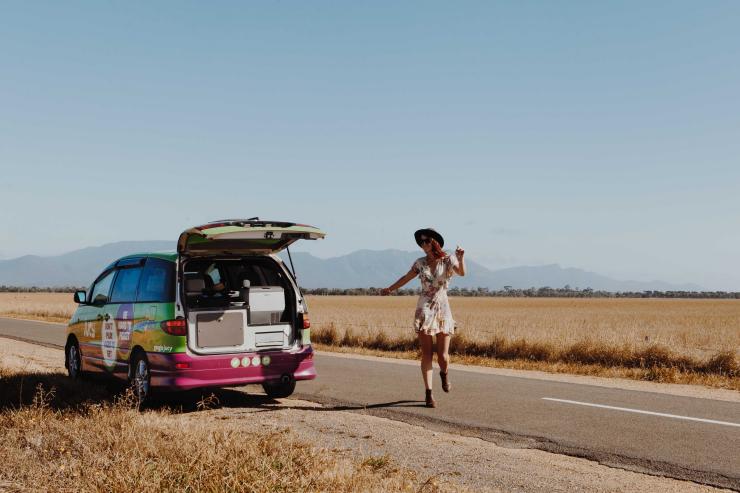The New Zealand Safe Travel Zone allows travellers from New Zealand to travel to Australia without the need to quarantine on arrival. You must have been in New Zealand for 14 days or more and not been in a designated COVID-19 hotspot. Find out more about COVID-Safe Travel in Australia here and more about the New Zealand Safe Travel Zone here.

Australian Capital Territory

New South Wales

Northern Territory

Queensland

South Australia

Tasmania

Victoria

Western Australia

External Territories
View more

Bondi

The Whitsundays

Esperance

Mornington Peninsula

Noosa

Jervis Bay

Port Douglas

Byron Bay

Ningaloo Reef

Airlie Beach
View more

Kangaroo Island

Rottnest Island

K’gari

Hamilton Island

Lord Howe Island

Tiwi Islands

Phillip Island

The Whitsundays

Bruny Island
View more

Margaret River

Barossa Valley

The Grampians

Hunter Valley

Yarra Valley

Bundaberg

Daylesford

McLaren Vale

Glass House Mountains

Mudgee

Beginner's guide

Accessible travel

Planning tips

Trip planner

Australian budget guide

Itinerary planner

Find a travel agent

Find accommodation

Find tours

Find transport

Visitor information centres

Deals and travel packages
View more

Facts about Australia

Experiences that will make you feel like an Aussie

People and culture

Health and safety FAQ

Weather

Seasons

Cities, states & territories

Iconic places and attractions
View more

You can find your wishlist here

Working in Australia FAQ
Planning your OE in Australia? Here are some answers to the most frequently asked questions.
Whether you’re considering Australia for your OE, a career break or a working holiday, you're sure to make memories for life. You’ll have the chance to discover stunning destinations, learn new skills, make lasting friendships and simply enjoy the people and places of Australia.
Frequently asked questions
As long as you have been in New Zealand for 14 days or more and have not been in a designated COVID-19 hotspot, you are eligible to enter Australia on a quarantine-free flight. You’ll need to ensure you have a valid Australian visa before you fly. If you are under the age of 30 (or 35 for French and Irish citizens), you can apply for the Working Holiday Maker program, which allows you to live and work in Australia for up to three years if you meet the requirements.
Find out more about applying for a Working Holiday Maker visa and relocation assistance to take up a job here.
If you're a New Zealand citizen, you'll be granted a visa at the border when you arrive. A Special Category visa (subclass 444) allows you to live, stay, work and study in Australia for as long as you remain a New Zealand citizen. It's free for New Zealand citizens and is applied for when you arrive in Australia and submit your completed incoming passenger card with your New Zealand passport.
Find out more about the Subclass 444 visa here.
New Zealand citizens do not have any restrictions on their work in Australia, and can work in any industry for any length of time. Backpackers and seasonal workers often find jobs in tourism, hospitality and agricultural work, which is readily available.
Visitors who are not New Zealand citizens coming to Australia on a Working Holiday Maker visa can extend their visa for an additional year (or two!) if they work in regional areas in specified jobs, including fruit picking, animal cultivation and bushfire recovery work, among others.
Agricultural work, fruit picking and crop harvesting jobs can be found in different areas of Australia at different times of the year. The Harvest Trail website is one of the best resources for information about harvesting jobs, available accommodation and more. Search for jobs by location, find out about relocation assistance, and get advice by contacting the Harvest Trail Information Service.
Relocation assistance of up to AUD $2,000 is available for New Zealand citizens and Working Holiday Makers coming from New Zealand when they relocate to take up short-term agricultural work.
If you are a New Zealand citizen, click here to find out more. If you are a Working Holiday Maker currently located in New Zealand, click here.
All employees working in Australia have rights and protections at work. The Fair Work Ombudsman (FWO) can help you understand your rights while working in Australia. Their service is free.
The FWO has information in 30 different languages, and storyboards (short videos) in various languages are available to assist you to understand your rights and obligations in Australian workplaces.
The FWO also has tailored information for workers in the fast food, restaurant and café industry and the horticulture industry.
You must be paid money for the work you do in Australia. The amount you need to be paid can depend on your age, duties and hours of work. Use the FWO’s Pay Calculator to make sure you have the right pay rates.
A pay slip must be given to you each time you are paid. Visit the FWO’s pay slips page to find out what should be included on yours.
Make sure you keep a record of the hours you work, the places you work and the type of work you are doing. Use a diary or download the FWO’s Record My Hours app. The app is available in various languages and is free to download from Google Play or the Apple App Store.
The FWO can also help with workplace issues and questions. You can’t get into trouble or have your visa cancelled for contacting the FWO for information about your pay or other entitlements. If you have a question about your workplace rights while working in Australia, you can ask the FWO online, or call them on 13 13 94 during business hours. If you or someone you know needs an interpreter when contacting the FWO, call the Translating and Interpreting Service on 131 450.
If you want to stay up to date with Australia’s workplace laws, follow the FWO on Facebook and Twitter.
Taxes will be deducted from any money you make. Before you can get paid you will need to open an Australian bank account. It’s also advisable to obtain a tax file number (TFN) to ensure you receive all due entitlements. Find more information on how to open a bank account and get a TFN here.
Volunteering is a great way to get involved with a local community and deepen your Australian experience. WWOOF (Willing Workers on Organic Farms) place travellers on organic farms, where farmers provide flexible jobs in exchange for accommodation and meals. Expect to work half a day for a full day’s board. This model applies to a huge variety of other volunteer roles, from rescuing turtles in Cape York to organising arts festivals in Arnhem Land.
You could also sign up as a Conservation Volunteer and work as part of a team to help preserve precious Australian eco-systems. Your meals, accommodation and travel to and from the project are provided.
If you'd like to help communities rebuild after natural disasters, sign up to volunteer with Blazeaid. You'll work alongside rural families to help them rebuild as well as lift their spirits.
Note: Tourism Australia is not the Australian government visa granting authority. The visa granting authority is the Australian Government Department of Home Affairs. For up-to-date information, please refer to their website: https://immi.homeaffairs.gov.au/visas/getting-a-visa/visa-finder.
The content on this page is for information purposes only and does not constitute legal advice. Please consult with an Australian qualified immigration lawyer or migration agent if you are seeking legal advice.





































































